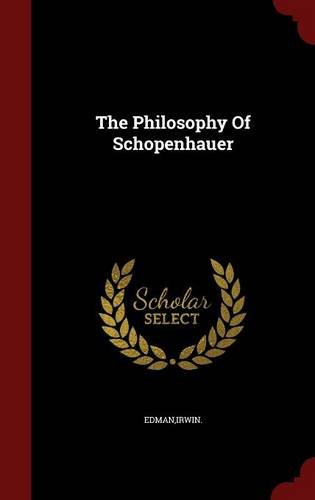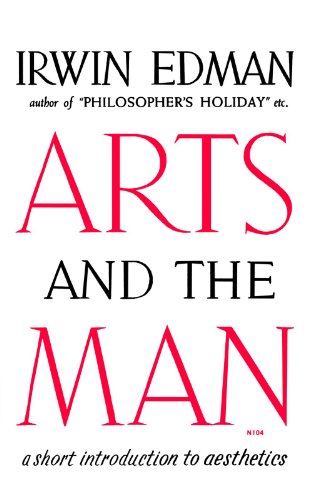Background
Irwin Edman was born in New York City, New York, United States on November 28, 1896. He was the son of Solomon and Fredericka Sklower Edman. His father, a shirt manufacturer, was born in Poland; his mother came from Germany.



( This work has been selected by scholars as being cultur...)
This work has been selected by scholars as being culturally important, and is part of the knowledge base of civilization as we know it. This work was reproduced from the original artifact, and remains as true to the original work as possible. Therefore, you will see the original copyright references, library stamps (as most of these works have been housed in our most important libraries around the world), and other notations in the work. This work is in the public domain in the United States of America, and possibly other nations. Within the United States, you may freely copy and distribute this work, as no entity (individual or corporate) has a copyright on the body of the work. As a reproduction of a historical artifact, this work may contain missing or blurred pages, poor pictures, errant marks, etc. Scholars believe, and we concur, that this work is important enough to be preserved, reproduced, and made generally available to the public. We appreciate your support of the preservation process, and thank you for being an important part of keeping this knowledge alive and relevant.
https://www.amazon.com/Philosophy-Schopenhauer-Irwin-Edman/dp/1297834380?SubscriptionId=AKIAJRRWTH346WSPOAFQ&tag=prabook-20&linkCode=sp1&camp=2025&creative=165953&creativeASIN=1297834380

( Arts and the Man is a revised and enlarged edition of t...)
Arts and the Man is a revised and enlarged edition of the author's book published in 1928 under the title The World, the Arts and the Artist.
https://www.amazon.com/Arts-Man-Short-Introduction-Aesthetics/dp/0393001040?SubscriptionId=AKIAJRRWTH346WSPOAFQ&tag=prabook-20&linkCode=sp1&camp=2025&creative=165953&creativeASIN=0393001040
Irwin Edman was born in New York City, New York, United States on November 28, 1896. He was the son of Solomon and Fredericka Sklower Edman. His father, a shirt manufacturer, was born in Poland; his mother came from Germany.
Edman attended New York City schools and was graduated from Townsend Harris Hall, a public high school for gifted students. In 1917 he received the B. A. from Columbia University and in 1920 the Ph. D.
His doctoral dissertation, Human Traits and Their Social Significance (published in 1920), was used as the text in a pioneer course in general education, "Contemporary Civilization, " that was introduced at Columbia at that time.
Edman spent his entire teaching career in the department of philosophy at Columbia. He became a full professor in 1935. At the time of his death he held the chair of Johnsonian professor of philosophy.
He lectured at many universities, including Harvard, Oxford, and the Sorbonne, and enjoyed extended visits to countries as various as Syria, Sweden, and Brazil. His close friendships with poets, novelists, critics, musicians, journalists, judges, and former students afforded him what he called a "diffused domesticity. " Edman conceived philosophy at its best to be a disciplined personal testament, an individual's way of summing up for himself the decisive factors in human destiny and the basic meaning to be found in experience.
A second and persistent interest of Edman's was mysticism and its relation to rational philosophy.
Edman's most popular book was Philosopher's Holiday (1938), a collection of essays, travel tales, and reflections on people and ideas. Although written with a light touch, the book is notable for its sanity and serenity, and bears witness to Edman's fundamental conviction that philosophy should thrive in a vivid and balanced life.
He died, of a heart attack, on September 4, 1954, in New York.
Edman's reputation rests on the combination of his achievements as a professional philosopher, a spokesman for humanistic learning, and a philosophical commentator on the passing scene (in this last role he wrote a column, "Under Whatever Sky, " for the American Scholar). He was noted for his qualities of lyricism and wit as a teacher and for his talents as a raconteur and writer of light verse.
( Arts and the Man is a revised and enlarged edition of t...)
( This work has been selected by scholars as being cultur...)
(Hardcover edition)
book
He believed that no single philosophy could give a final and universally valid account of such matters but that all the major philosophies presented insights of indispensable value.
But Edman was not an eclectic. His philosophy was much influenced by his teacher John Dewey. A naturalist, Edman assumed that the human mind has no life or reality apart from its material conditions and that ideas are the instruments of a social animal so formed that the construction of meanings and the imaginative tracing of consequences are indispensable to its survival and happiness. But it was man's capacity to live in and for ideas as though they were independent things in themselves that most caught Edman's attention. As he said of himself, he was "an empiricist homesick for Platonism. " In this regard he was closer in the fundamental bent of his mind to George Santayana, the Spanish-born philosopher who taught at Harvard for many years, than to Dewey and other pragmatists. Edman disagreed with Santayana's later philosophy, however, particularly opposing his later political views, with their distaste for democracy and liberalism.
In Four Ways of Philosophy (1937), Edman's most sustained work in technical philosophy, he developed a portrait of man as the product of blind evolutionary forces who, nevertheless, "stands at the pinnacle of nature and looks beyond it to a world of Truth, Goodness, and Beauty, not as a second shadow world, a supernature, but as this world's still unrealized, never completely to be realized, good. "
Edman believed that the arts, along with philosophy, performed the function of delineating this second world, and his primary professional interest was in the philosophy of art.
In The Mind of Paul (1935), which recreated in imagination the outlook of Paul of Tarsus, who believed that the truth lay beyond logic and analysis, Edman offered a critical but sympathetic account of mysticism's contributions to human thought.
His special talent as a teacher and writer lay in his capacity to catch and express the idiosyncratic visions of vastly different thinkers.
The charm and zestfulness of his presence disguised a tough and seasoned intelligence, and the lucidity of his prose an ironical sense of the complexities and paradoxes of the human scene.
Edman never married.
